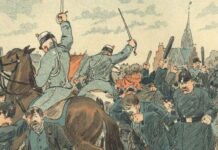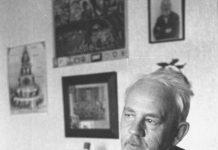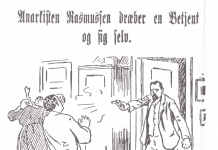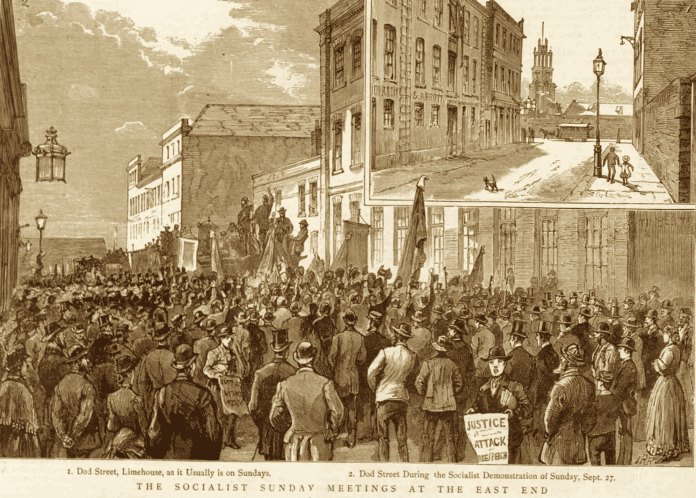
Socialistisk Biblioteks Tidslinje med links til begivenheder og personer i 1855.
Se også Index over personer, organisationer/partier og værker (som bøger, malerier, mm.), steder, begivenheder, mv., der er omtalt på hele Tidslinjen, titler og indhold på emnelisterne osv.
16. januar 1855
Eleanor “Tussy” Marx fødes, senere redaktør af skrifter af Karl Marx, skribent og oversætter. Yngste datter af Karl og Jenny Marx. (Selvmord 31. marts 1898).
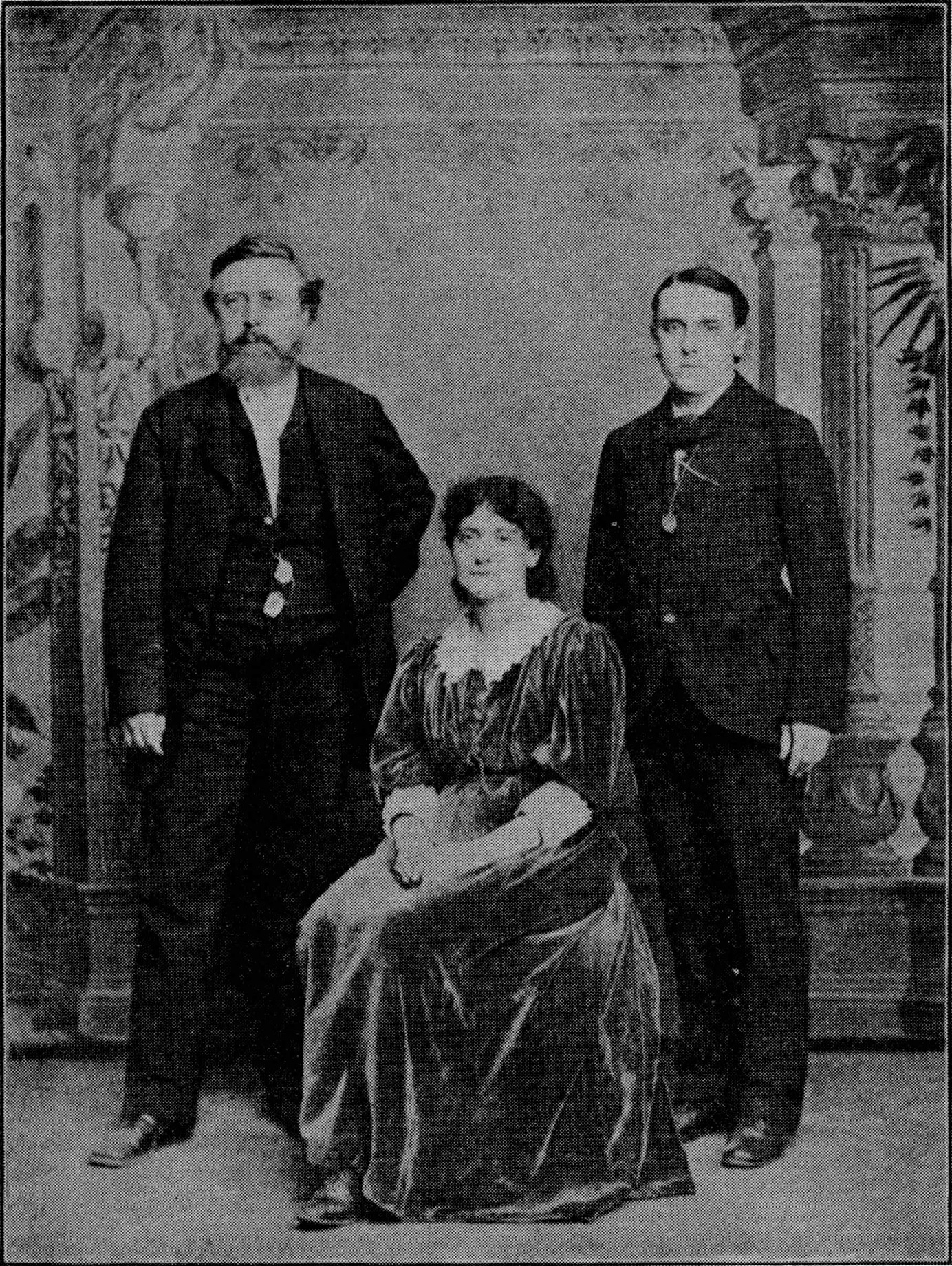
Leksikale/Encyclopedias:
- Marx (Aveling), Eleanor (Tussy) (Leksikon.org).
- Eleanor Marx (Spartacus Educational).
- Eleanor Marx (Marxist Internet Archive, Marxist Writers). Biography – Works – Editions, translations.
- Eleanor Marx (Wikipedia.org). Med gode links.
Artikler/Articles:
Eleanor Marx – socialistisk agitator, organisator og forfatter. Af Gerd Callesen (Arbejderen.dk, 27. marts 2012). “Karl Marx’ yngste datter, Eleanor, brugte mange år af sit liv på at støtte faderens teoretiske arbejde. Men hun var også aktivt engageret i flere strejker og opbygningen af den engelske fagbevægelse.”
Miss Marx: Eleanor Marx in the filmmaker’s own image. By Joanne Laurier (World Socialist Web Site, 18 February 2021). “Miss Marx, an Italian-Belgian production written and directed by actress-filmmaker Susanna Nicchiarelli, concerns itself with the latter part of Eleanor Marx’s life … The film covers certain aspects of Eleanor’s political and public activity, but it leans heavily toward an interest in her emotional life.”
Who was Eleanor Marx? (Verso, Blog, 22 November 2018). Excerpt from the introduction of Yvonne Kapp’s newly republished biography: “Eleanor Marx is one of the most tragically overlooked radical figures in history. Sally Alexander explores her outstanding contribution to radical history.”
Writing Eleanor Marx (Verso, Blog, 6 July 2018). “In this excerpt from her memoirs, activist and writer Yvonne Kapp reflects on the decade-long research and writing of her definitive biography of Eleanor Marx.”
The inspirational life of Eleanor Marx. By Christine Thomas (Socialism Today, Issue 186, March 2015). “Eleanor Marx was in her own right a leading political activist, writer, speaker, trade unionist, socialist feminist and internationalist …”
Rediscovering Eleanor Marx. By Siobhan Brown (Socialist Review, Issue 397, December 2014). Extract from her A Rebel’s Guide to Eleanor Marx (Bookmarks, 2014, 64 p.), plus extract of Eleanor Marx’s May Day speech. See also review by Sadie Robinson: Reclaiming Eleanor Marx for the rebels of today (Socialist Worker, Issue 2434, 16 December 2014).
Eleanor Marx – the activist who built unions and fought oppression (Socialist Worker, Issue 2412, 15 July 2014). “Sarah Ensor looks at the life of Eleanor Marx … and interviews author of a new biography Rachel Holmes.”
The making of a Marx: The life of Eleanor Marx, the mother of socialist feminism. By Rachel Holmes (The Independent, 16 May 2014). On Rachel Holmes’ book, Eleanor Marx: A Life (Bloomsbury, 2014, 528 p.). See review by Ben Gliniecki (Marxiststudent.com, May 9, 2014) + review by Deborah Roberts (International Socialist Review, Issue 97, Summer 2015) + review by Charlie Gardner (RS21: Revolutionary Socialism in the 21st Century, September 15, 2016).
Eleanor Marx (Workers Liberty, 4 December, 2006). “Fran Broady describes the life of Eleanor Marx and the early days of the Marxist organisation in the British labour movement.”
Eleanor Marx (Socialist Worker, Issue 1980, 10 December 2005). “John Rose looks at the politics of Karl Marx’s daughter.”
Obituary: Marxism in vogue. By Lindsey German (Socialist Review, Issue 233, September 1999; online at Internet Archive). “The death of Yvonne Kapp at the age of 96 should be marked with the respect due to the author of one of the best biographies ever written.”
Eleanor Marx. By E.P. Thompson (New Society, 1976; online at Marxists Internet Archive). Review of Yvonne Kapp, Eleanor Marx, Vol. 1-2 (Lawrence and Wishart, 1972/1976). “This book has already received a generous welcome, and it deserves to do so.”
What drove Eleanor Marx to suicide. By Eduard Bernstein (Justice, 30 July 1898; online at Marxists Internet Archive).
Se også på Socialistisk Bibliotek:
- Linkboxen: Karl Marx 200
- Tidslinjen: 5. maj 1818, om Karl Marx.
- Tidslinjen: 12. februar 1814, om Jenny Marx (gift med Karl Marx 1843-1881).
5. november 1855
Den nordamerikanske socialist og leder af Socialist Party Eugene V. Debs fødes i Terre Haute, Indiana (dør 20. oktober 1926, Elmhurst, Illinois).
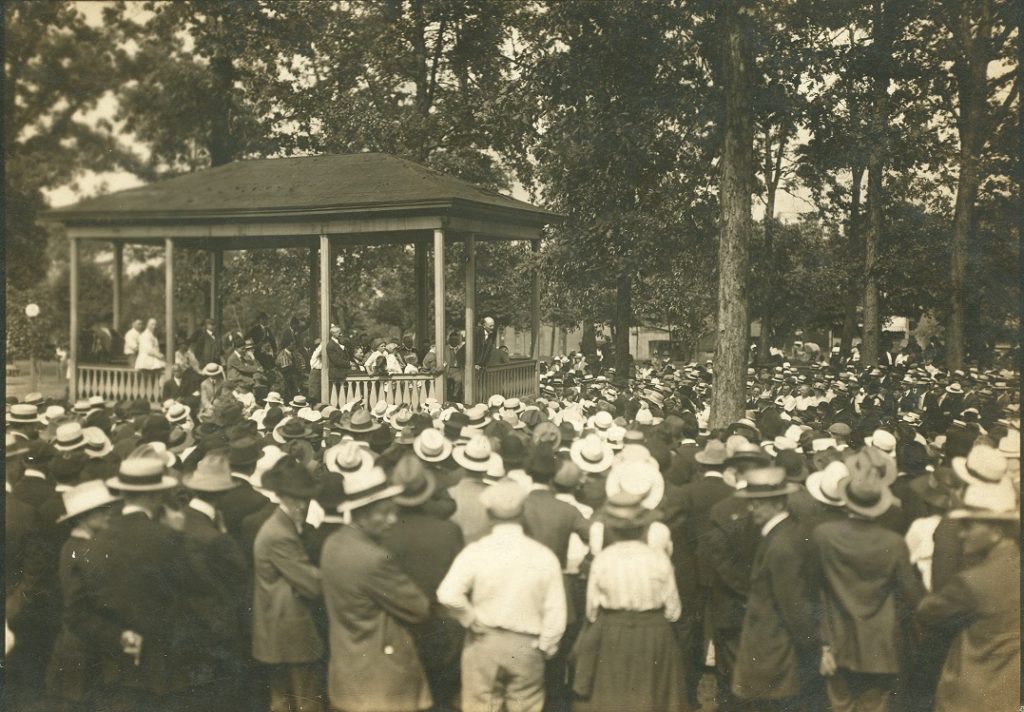
Links:
- Debs, Eugene V. (Leksikon.org).
- Eugene V. Debs Internet Archive (Marxists Internet Archive; Marxist Writers). With articles and speeches by Debs, Biographies, critiques and memoirs of Eugene V. Debs and a longer biographhy by Stephen Marion Reynold.
- Eugene V. Debs (Spartacus Educational).
- Eugene V. Debs Foundation (site).
- Speeches of Eugene V. Debs (pdf) (New York, International Publishers, 1928, 95 p.; online at Marxists Internet Archive) (Voices of Revolt, 9). With introduction by Alexander Trachtenberg (p.7-26).
The Cold War is over. It’s time to appreciate that Eugene Debs was a Marxist. By Ed Quish (Jacobin, March 15, 2021). “For decades, many of Eugene Debs’s admirers have claimed that the socialist leader was a good, patriotic American unsullied by a foreign doctrine like Marxism. But the Cold War is over, and there’s no need to be defensive: Debs was a Marxist who rightly opposed American nationalism.”
Eugene Debs believed in socialism because he believed in democracy. By Shawn Gude (Jacobin, September 2, 2020). “Eugene Debs’s unswerving commitment to democracy and internationalism was born out of his revulsion at the tyranny of industrial capitalism. We should carry forth that Debsian vision today — by recognizing that class struggle is the precondition for winning a more democratic world.”
The young Eugene V. Debs (Jacobin, August 28, 2020). An interview with Tim Davenport: “A pair of leftist historians has undertaken a massive project: compiling a six-volume collection of Eugene Debs’s writings and speeches. We spoke with one of them, who detailed Debs’s extraordinary journey from moderate young trade union leader to courageous socialist militant.”
Eugene Debs was an American hero. By Shawn Gude (Jacobin, June 16, 2020). An interview with Ernest Freeberg: “On June 16, 1918, Eugene Debs gave the anti-war speech that would soon send him to prison. His arrest sparked a nationwide movement to secure his release — and forced the government to finally recognize the free speech rights of wartime dissenters.”
New York Times column falsifies legacy of Eugene Debs. By Tom Mackaman (World Socialist Web Site, 30 April 2019). “Written by Hamilton College professor Maurice Isserman, the article presents Debs as a tragic figure who attempted to create a distinctly ‘American socialism’ only to see it fail.”
The relevance of Debs in the new gilded age. By Louis Proyect (CounterPunch, February 8, 2019). Review of Eugene V. Debs: A Graphic Biography. By Paul Buhle, Steve Max, and Dave Nance and illustrated by Noah Van Sciver (Verso, 2019, 144 p.). “What a comic book can do is provide a snapshot that will lead to a deeper engagement with the subject matter. With that end in mind, Buhle and Max have succeeded.” See also review by Sasha Simic (Socialist Review, Issue 445, April 2019) + review by Sean Ledwith (Counterfire, December 3, 2020).
American Socialist: The Life and Times of Eugene Victor Debs—A fatally flawed documentary. By Fred Mazelis (World Socialist Web Site, 5 March 2018). “On the basic facts of Debs’ life and career, Strom’s film is accurate and informative. Its use of audio and video, combined with the reading of letters and speeches, makes much of this history come alive … However, when it comes to the legacy of Debs—what his struggle means today—the movie should come with a giant warning sign.” See also review by Guy Miller: Introducing…Eugene Debs (SocialistWorker.org, March 13, 2018) + Michael Hirsch: New Eugene Debs film does the socialist proud (The Indypendent, April 26, 2018) + Louis Proyect: From Debs to Berlusconi (CounterPunch, March 10, 2017).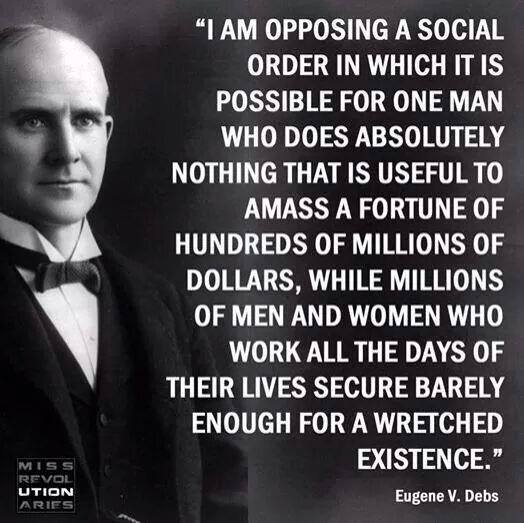
US elections – before Bernie Sanders came Eugene Debs. By Charlie Kimber (Socialist Worker, Issue 2498, 5 April 2016). “Debs was a revolutionary who used elections to develop a political movement based on the struggles of working people.”
Debs for his time and ours. By Allen Ruff (Against the Current, Issue 180, January-February 2016). Review of William A. Pelz (ed.), Eugene V. Debs Reader: Socialism and the Class Struggle (Merlin Press, 2014, 256 p.): “This new release of selected writings and speeches by Eugene Victor Debs (1855-1926) could not be more timely.”
The measure of a revolutionary. By Mark Harris (SocialistWorker.org, September 17, 2015). “There’s a tendency among defenders of the status quo to turn great historical figures like Eugene Debs into harmless icons.”
Something to offer. By William P. Jones (Jacobin, August 11, 2015). “Unlike many in his party, Eugene V. Debs believed the struggle for black equality was critical to realizing the promise of socialism.”
Socialism according to Eugene V. Debs (SocialistWorker.org, July 9, 2015). “Elizabeth Schulte tells the story of American socialism’s best-known figure.”
How Debs became a socialist (SocialistWorker.org, February 18, 2011). “Paul D’Amato looks at the events and experiences that lead Debs to become a socialist.”
Vote for Prisoner 9653. By John Newsinger (International Socialism, Issue 126, Spring 2010, p.217-218). Review of Ernest Freeberg, Democracy’s Prisoner: Eugene Debs, the Great War and the Right to Dissent (Harvard University Press, 2010, 392 p.): “Ernest Freeberg’s book tells the story of Debs’s trial and imprisonment and of the campaign to set him free.”
Eugene Debs and American socialism. By Bill Roberts (International Socialist Review, Issue 67, September-October 2009). Review of Ray Ginger, The Bending Cross: A Biography of Eugene V. Debs (Haymarket Books, 2007, 516 p.): “Ray Ginger’s wonderful biography of Debs, first published in 1949, introduces readers to a working-class hero as well as a period of immense struggle from below often treated as a footnote in most U. S. histories.”
The birth of American socialist Eugene Debs. By Nigel Davey (Socialist Review, Issue 246, November 2000). “Eugene V Debs, born on 5 November 1855, was one of America’s most popular socialist figures.”
Eugene V. Debs and the idea of Socialism. By Howard Zinn (The Progressive, January 1999; online at Marxists Internet Archive). “Debs was what every socialist or anarchist or radical should be: fierce in his convictions, kind and compassionate in his personal relations.”
The Debs way. By Leo Huberman (Monthly Review, Vol.70, No.11, April 2019). “An address Huberman delivered at the Debs Centennial Meeting held at the Fraternal Clubhouse in New York City on November 28, 1955. It was first published in Monthly Review 1956.”
The Canton, Ohio speech. By Eugene V. Debs (International Socialist Review, Issue 20, November-December 2001). “Eugene V. Debs, the most prominent leader of the Socialist Party, delivered this fiery speech against the First World War to 1,200 people at the Ohio state convention of the Socialist Party on June 16, 1918.”
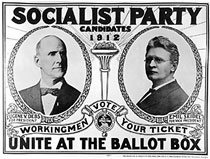
Se også:

- Socialist Party of America (Wikipedia.org).
- The rise and fall of the Socialist Party of America. By Paul Heideman (Jacobin, 20 February 2017). “Despite its ultimate demise, the Socialist Party shows us that the United States possesses no special immunity against socialist politics.”
11. november 1855
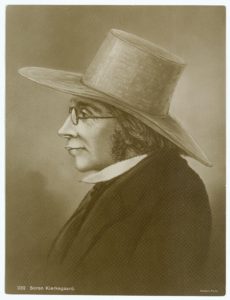
Den danske filosof Søren Kierkegaard dør. (Født 5. maj 1813).
Leksikalt:
- Kierkegaard, Søren Aabye. Af Peter Thielst (Leksikon.org).
- Søren Kierkegaard. Af Niels Jørgen Cappelørn mfl. (Denstoredanske.dk) (13 printsider).
- Søren Kierkegaard. Af F.J. Billeskov Jansen (Dansk Biografisk Leksikon) (15 printsider).
- Kierkegaard, Søren (1813-1855) (Marxist Internet Archive; Glossary of People).
Text:
The Concept of Dread. Introduction (1844)
På dansk: Begrebet Angest: Indledning I hvilken Forstand Overveielsens Gjenstand ..., side 13-25 (Arkiv for dansk litteratur: Det Kongelige Bibliotek)
Artikler:
SK 2013 – Kierkegaard – katalog (Højskolebladet, 6. september 2012). “Til arrangører af folkelig formidling af Søren Kierkegaards tankeunivers i anledningen af 200-året for hans fødsel.” Bladrekatalog over Kierkegaard-emner og tanker (pædagogisk serveret!).
Den enkelte og fællesskabet: Søren Kierkegaard 200 år. Af Klaus Haase (Arbejderen.dk, 3. juli 2013)
Angst æder sjæle: Søren Kierkegaard 200 år. Af Bjarne Nielsen (Arbejderen.dk, 7. maj 2013)
Forsonet i passionen for den magiske magister (Information.dk, 3. maj 2013). Interview med Joakim Garff og Peter Tudvad. “den mest opsigtsvækkende og udmagrende litterære fejde i nyere dansk historie: Striden om SAK.” 2000-2001
Veiviseren Kierkegaard (Klassekampen.no, 8. april 2013). Interview med Agnes Ravatn.
En antikrist og fuglekonge giver svar på tiltale. Af Peter Tudvad (Kristeligt Dagblad, 5. december 2011).
Søren Kierkegaard og den utæmmelige antisemitisme. Af Peter Tudvad (Kristeligt Dagblad, 14. november 2011).
SAK: en uvidenskabelig biografi om Søren Aabye Kierkegaard. Af Peter Tudvad (Faklen, 2004).
Only suffering God can save us: Section 2: Kierkegaard (Ch. 3 in Slavoj Zizek: God in Pain: Inversions of Apocalypse, with Boris Gunjevia (Seven Stories Press, 2012).
Either / Or: Badiou / Kierkegaard’. By Benjamin Noys (Academia.edu, 2011, 23 p.).
A closer look at Kierkegaard. By Tom Carter (World Socialist Web Site, 17 April 2006). Review of Joachim Garff, Søren Kierkegaard: A Biography (Princeton University Press, 2005).
Happy Birthday Marx and Kierkegaard! (Ethicist for Hire, May 5, 2014). “… an anecdote about the time Marx and Kierkegaard met, perhaps.”
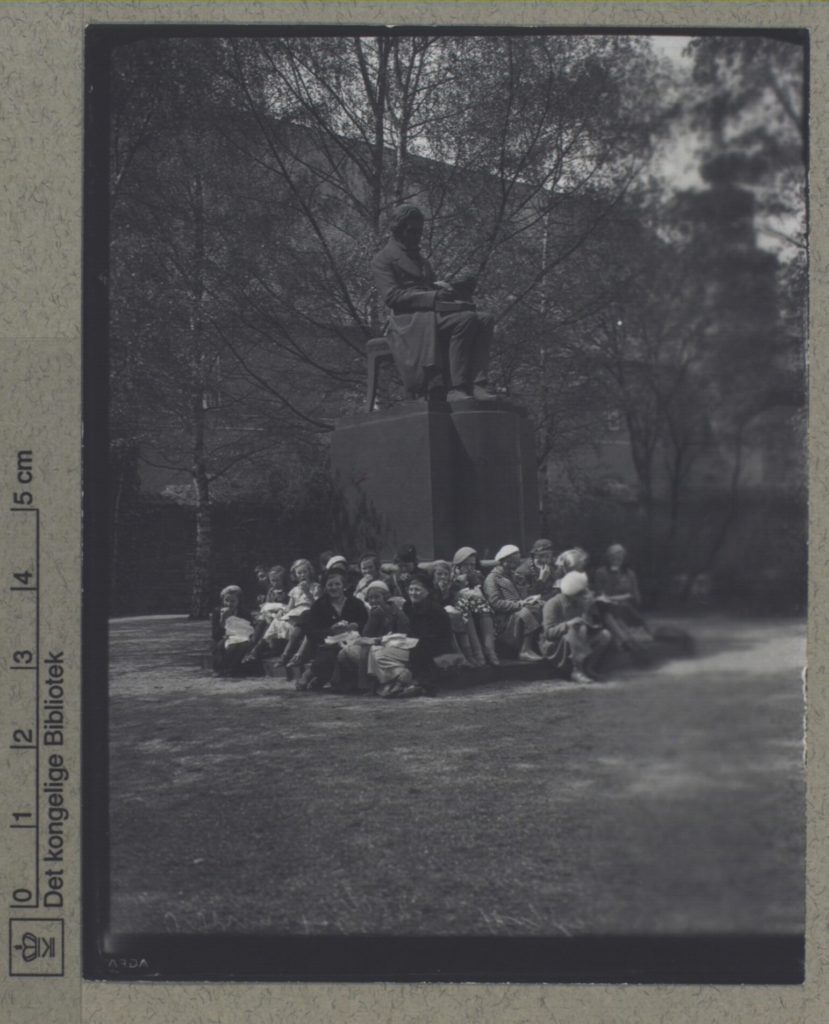
Tekster af:
Søren Kierkegaards Skrifter (SKS) (Søren Kierkegaard Forskningscenteret, 2013). Indhold: Trykte skrifter – Utrykte skrifter – Journaler og papirer – Breve og dedikationer – Resourcefiler: Ordkonkordans, registre mv.
Litteratur:
Stadier på antisemitismens vej: Søren Kierkegaard og jøderne. Af Peter Tudvad (Rosinante, 2010, 585 sider).
Part I of the Preface to Tudvad’s book Stadier paa antisemitismens vej (Piety on Kierkegaard). With debate on Peter Tudvad’s book “Stadier på antisemitismens vej: Søren Kierkegaard og Jøderne” (Rosinante, 2010).
Livet forstås baglæns, men må leves forlæns: Kierkegaard – en guldalderhistorie. Af Peter Thielst (Det Lille Forlag, ny rev. udg., 2004, 288 sider). Flere forsk. udgaver af denne populære Kierkegaard-introduktion.
SAK: Søren Aabye Kierkegaard: en biografi. Af Joakim Garff (Gad, 2000, 738 sider). (Jubilæumsudgave 2013).
Søren Kierkegard: bidrag til kritikken af den borgerlige selvoptagenhed. Af Kresten Nordentoft (Dansk Universitets Presse, 1977, 242 sider). Side 69-122: ‘Kierkegaard og det borgerlige samfund’, side 123-218: ‘Kierkegaard, Freud og Marx’.
Historieproblemet hos Kierkegaard og den unge Marx. Af Hans Erik Avlund Frandsen (Poetik 26, årgang 7, nr. 2, 1975, 90 sider; online på Socialistisk Bibliotek).
“Hvad siger Brand-Majoren?”: Kierkegaards opgør med sin samtid. Af
Kresten Nordentoft (Gad, 1973, 295 sider).
Søren Kierkegaard og den menige mand. Af Jørgen Bukdahl ( Munksgaard, 1961, 125 sider).
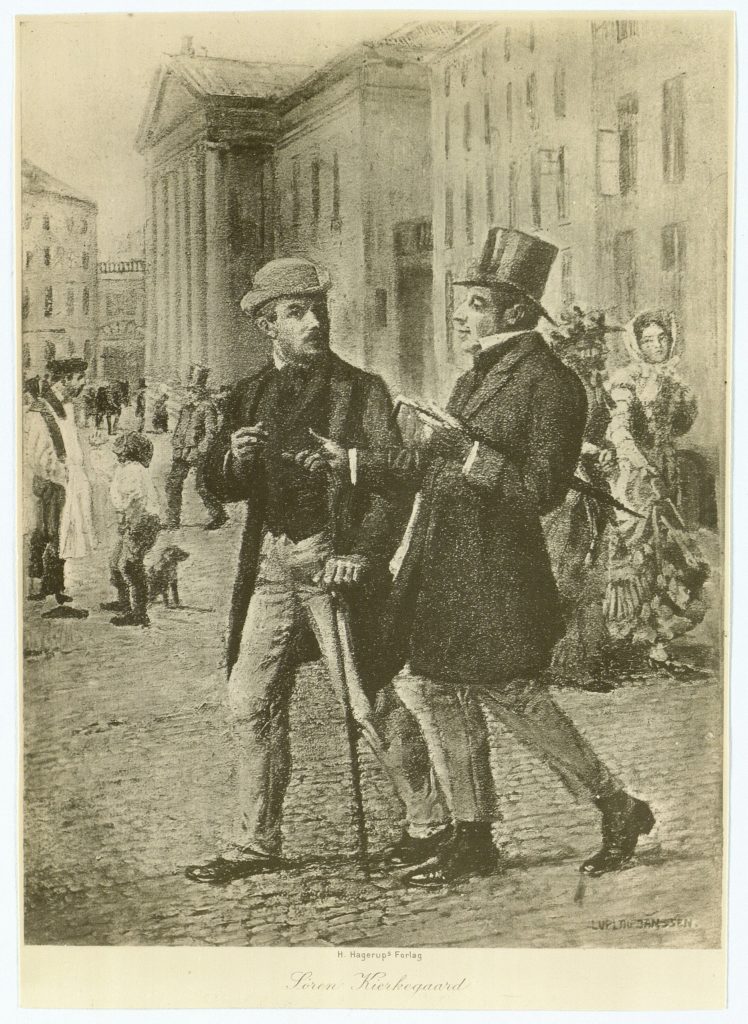
“Dødens alvorlige Betragtning” – med Søren på Assistens Kirkegård. Af Peter Tudvad.
Med Søren Kierkegaard på vejen til Assistens Kirkegård. Af Peter Tudvad.
Video: Søren Aabye Kierkegaard (Københavns Kirkegårde. Udg. af Københavns Kommune & Assistens Kirkegård) (6.02 min.; 3-6 min. henne om gravstedet på Assistens Kirkegård).
Se også:
Marxism Versus Existentialism. By George Novack (George Novack’s “Understanding History”; Marxists Internet Archive)
Se også på Socialistisk Bibliotek:
Indskannet tekst: Historieproblemet hos Kierkegaard og den unge Marx. Af Hans Erik Avlund Frandsen (Poetik 26, årgang 7, nr. 2, 1975, 90 sider).
Søren Kierkegaard. På linksamlingen Socialister på Socialister på Assistens Kirkegård: Link til socialistiske personligheder begravet på Assistens Kirkegård.
















